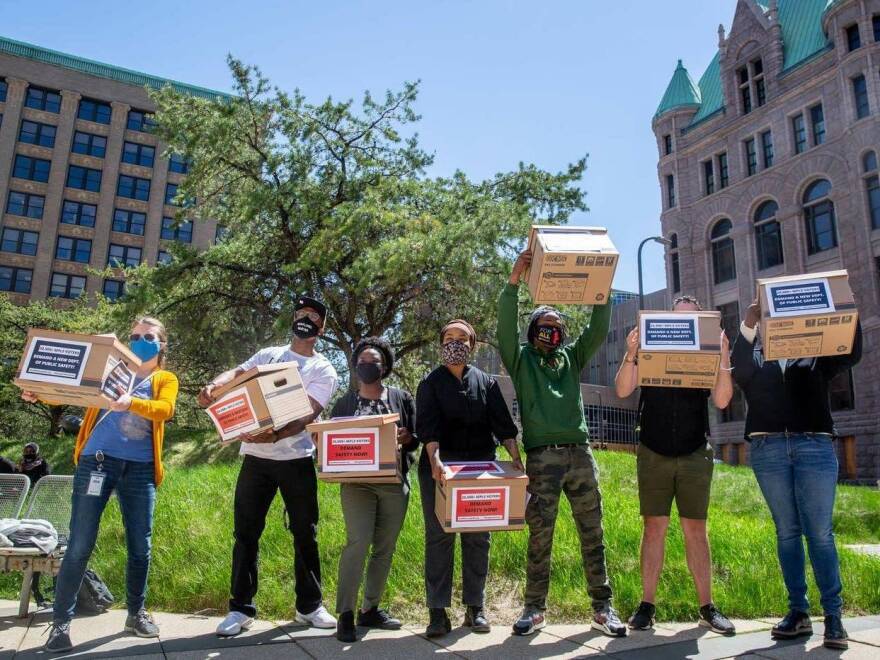The murder of George Floyd a year ago brought an idea long considered radical into the mainstream of political debate. Last June, a veto-proof majority of Minneapolis City Council members pledged to defund and dismantle the police department.
But now, those same elected officials have softened their tone. And even backers of a police reform proposal headed to the city's November ballot say their measure would not eliminate armed officers.
Thirteen days after former Minneapolis police officer Derek Chauvin killed George Floyd, nine city council members stood on a stage at Powderhorn Park. At their feet were giant block letters that spelled out the words "defund police."
The council's draft charter amendment last year called for replacing the Minneapolis Police Department with a Department of Community Safety and Violence Prevention. The language said that this department may include — but would not be required to have — a "division of law enforcement services." The proposal was halted by the city's charter commission and did not go before voters last November.
The council took another crack at it in January, early enough in the year that the commission couldn't block it through its review process. This latest version has a key difference; it would require the city to have a police department. Council Member Steve Fletcher, who was on that Powderhorn Park stage last June, is one of the sponsors.
"What we really want is to put a clear question to voters to really confirm that we're going in the right direction and to let them tell us we're not," Fletcher said. "And so we want to say 'Do you want to change the charter to have a department of public safety instead of a police department? Yes or no.'"
This plan would give the city council more oversight of police. And it would eliminate a minimum staffing requirement of 17 officers per 10,000 residents.
The council's proposal isn't the only one on the table.
Yolanda Roth with Take Action MN is among the backers of a citizen-led charter proposal. Last month Roth went to City Hall with the Yes 4 Minneapolis coalition and dropped off more than two dozen banker's boxes full of petition signatures. She said the group's measure would free up resources for a more holistic approach to public safety.
"Food safety, housing safety, safety in our schools, in our homes, in our lives. We're giving everyone in Minneapolis a chance to decide what safety means to them," Roth said.
The Yes 4 Minneapolis plan is similar to the council's, but does not include a requirement for police. Fletcher said council members will likely withdraw their amendment so voters aren't confused.
Munira Mohamed with the Minnesota ACLU is part of the Yes 4 Minneapolis effort, and wants to make it clear that getting rid of cops is not their intent. She said handing off tasks such as mental health intervention and low-level traffic enforcement to other professionals would help police do their jobs.
"When you don't have police stopping people for such minor traffic enforcement violations such as tinted windows or registration, what you do is you save them time and you have them actually focus on violent crime, and you actually have them solve murders," Mohamed said.

Stopping violent crime is an urgent concern in Minneapolis. Thirty-one people have died by homicide so far this year, more than twice as many as this time in 2020. The victims include 6-year-old Aniya Allen, who was caught in a shootout.
Mayor Jacob Frey says the depleted police force is struggling to keep up. In the last year, more than 200 officers have quit, retired or taken extended medical leave.
On the north side last week, Frey pushed back on the charter proposals. He outlined a plan of his own that involves reforming the department from within. Among other things, he wants to reduce minor traffic stops, strengthen internal affairs investigations and boost peer intervention training. Frey also hopes to rebuild the department to its full authorized strength of 888 officers by the end of 2023.
"Victims and families that have suffered for far too long from gun violence, they matter. And it's incumbent on each and every one of us to stand up, to make sure that they feel safe within their neighborhoods," Frey said.
Now that the city clerk has determined that Yes 4 Minneapolis collected enough valid signatures for its charter proposal, city attorneys are set to draft the official ballot language. Barring any procedural hiccups, that means the future of policing in Minneapolis will be in the hands of voters this fall.
Copyright 2021 MPR News


